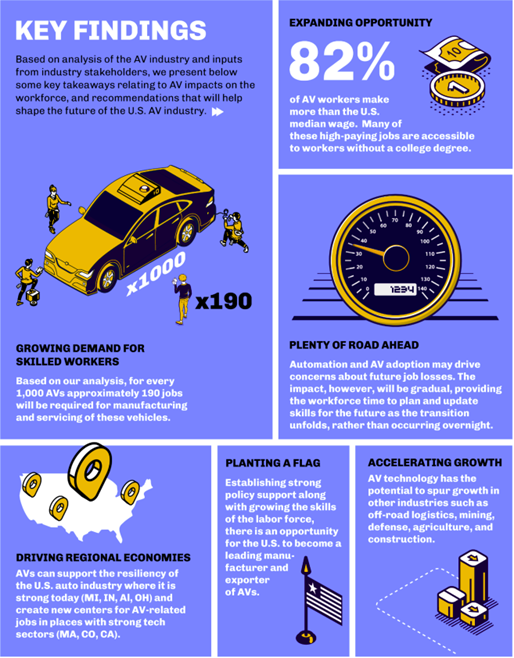Recently, Steer and Fourth Economy co-authored a report for the Chamber of Progress that explores the economic impact of autonomous vehicles (AV) – here, meaning vehicles containing tech that can understand road conditions, such as adaptive cruise control - on the US job market. The findings indicate that the AV market could generate up to 455,000 jobs over the next 15 years in the US, encompassing roles from production and assembly line workers to maintenance technicians. That represents 190 jobs created for every 1000 AVs on American roads.
The report also says that rather than overnight joblessness, the slow rollout of AV can result in a smooth transition to a high-skilled and high-wage automotive industry. Roles will include everything from science, technology, engineering and math (STEM) jobs to business support and manufacturing. 82% of AV workers make more than the US median average wage, and many of those jobs are accessible to those without a college degree, 59% of whom working in the AV industry earn more than the US median wage.
The gradual nature of AV adoption will allow the workforce to adapt over time. Training and education programs will be essential to reskill and upskill workers, ensuring they can transition into new roles created by the AV industry. Collaboration with educational institutions and industry partners will be key to developing a skilled workforce ready to meet the demands of this evolving sector.
Finally, the report also highlights that AVs have the potential to transform the U.S. into a major exporter of vehicles, parts, technology, and knowledge. The AV industry is poised to stimulate regional growth in traditional automotive manufacturing areas across the Midwest and the South, which can link blue-collar regions to tech hubs and bring economically disparate regions of the US together. Strong policy support and investment in workforce skills are crucial to maintaining and expanding the U.S.'s leading position in the AV market.

How we can help you
- At its core, our work helps clients to plan, develop, and implement new transport technologies. Steer expertise is based on a deep understanding of the factors which help or hinder the adoption of new technologies, and monitoring and evaluation of new services enable us to build an evidence base to inform planning and implementation.
- New technologies and business models are changing the way that people and goods move around our urban, suburban, and rural communities. Navigating these changes effectively is essential to maximize the benefits (more efficient, lower emission, safer, and personalized services) and minimize the risks (increased congestion, carbon and particulate emissions, and inequalities).
We support both operators and public bodies worldwide, providing knowledge, insight, and guidance on the implementation and development of technologies to complement existing services while maintaining a commercial understanding of business needs and the need to meet carbon reduction targets. Our comprehensive approach ensures that our clients can navigate the complexities of AV adoption, from planning and development to execution and monitoring, maximizing economic benefits while minimizing potential risks.
Whether you are an operator looking to integrate AVs into your fleet or a public body aiming to develop supportive policies, we provide the expertise and strategic guidance necessary to succeed in this rapidly evolving landscape.
Contact an expert: Chris Worley (Fourth Economy) and Alia Verloes (Steer).

